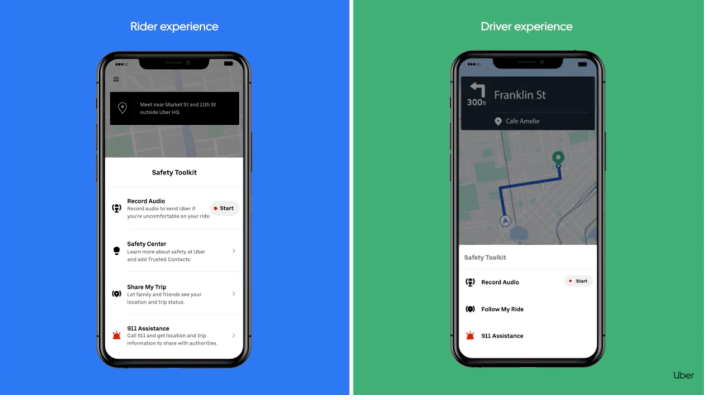Uber is adding several new safety features to its app, including an audio reminder to riders to wear their seat belts, allowing riders or drivers to record audio during rides, and detection of unexpected route changes or stops before the final destination. The updates are designed to help both riders and drivers feel safer during trips, Uber said.
“Many people admit to not always buckling up in the back seat, especially on shorter trips, and that can create an uncomfortable situation for drivers,” Kristin Smith, road safety public policy manager at Uber, told TechCrunch. “We think introducing an audio reminder can help reinforce the message that people need to buckle up in every seat, every time. This feature builds on a number of seat belt awareness campaigns we’ve launched over the past several years. We’ve partnered with GHSA on our ‘Make It Click’ Campaign and have worked to educate riders and drivers on the importance of wearing a seat belt.”
The seat belt feature will begin to roll out to some users later this month and expand nationally early next year, according to an Uber spokesperson, who also said the impetus for the audio alert came in part from feedback from drivers who bear the brunt of responsibility for paying off tickets. He also said the audio alerts are the result of recent National Highway Traffic Safety Administration stats, which found that while Americans drove less in 2020, the projected fatalities is the highest since 2007. At the start of the trip, the driver’s phone will have an audio alert reminding riders to buckle up, while a push notification is sent to the rider’s phone.
The audio recording feature, which has been live in Latin America for around two years, will begin rolling out in the U.S. next week as a pilot in Kansas City, Louisville and Raleigh-Durham. Drivers and riders can choose to record audio by tapping the shield icon on the map screen and selecting “Record Audio.” If a driver has opted into the feature, riders will get a notification within the app before the trip begins.
The audio files are encrypted and stored on the rider’s or driver’s device, and no one, including Uber, can listen to the recording, according to the company. If a user submits a safety report to Uber, they can attach the audio file to their report and a trained Uber safety agent will decrypt and review the recording as evidence to help determine what happened and what to do next.
Finally, Uber is enhancing RideCheck nationwide on Thursday, a feature the company added in 2019 to detect possible crashes or unusually long stops during a trip using GPS data and sensors in the driver’s smartphone. Now, RideCheck has expanded to detect when a trip ends unexpectedly before reaching the final destination or when a driver goes off course.
When the system detects possible issues, both the rider and driver will receive a RideCheck notification prompting them to let Uber know through the app that all is well or take other actions like pressing the emergency button or reporting the issue.
Over the summer, dozens of women represented by a handful of California plaintiffs’ firms filed suit against Uber over alleged sexual attacks by drivers in multiple U.S. states. Both Uber and Lyft have faced claims for years of drivers assaulting passengers, but those lawsuits have either ended in voluntary dismissals or settlements as the companies have consistently denied liability, according to Bloomberg Law.
Many of the new claims against Uber are based on negligence, asserting Uber has been aware of the danger of sexual assaults committed by drivers and hasn’t taken reasonable preventative steps, all the while advertising safe rides to the public, according to the law firm bringing the case in California referenced above. Some firms are claiming “common carrier” negligence, saying that Uber is classified as a transportation company under California law and therefore owes its passengers a better duty of care. Several of the cases are also claiming product liability, saying that Uber’s product, the app-based platform connecting riders and drivers, fails to keep passengers safe.
The new safety features, in particular the audio recording and updates to RideCheck, could be moves by the ride-hailing giant to cover its bases in the midst of lawsuits. Uber did not comment on the claims against the company, instead pointing out that the audio recording feature has been present in 14 Latin American countries since 2019, where 70% of riders and drivers surveyed in Rio de Janeiro said the feature made them feel safer when using Uber.
Also in 2019, Uber came under fire for its safety transparency report, which revealed that the company had received nearly 6,000 reports of sexual assault in 2017 and 2018 on its platform. Uber has stressed the fact that the report also showed safety incidents overall are extremely rare, with 99.9% of trips ending without any safety reports at all. Nonetheless, the report prompted a probe from the California Public Utilities Commission (CPUC), which later fined Uber $150,000 for refusing to hand over data about drivers and riders who were sexually assaulted. (Uber also agreed to pay the CPUC $9 million to be spent on addressing physical and sexual violence in the state.) The CPUC specifically wanted incident details including date, time and location of assault — information that Uber’s GPS capabilities and these new safety features, like reports of shortened rides, could potentially provide.
An Uber spokesperson told TechCrunch that nothing specific had prompted the enhancements to RideCheck.
“We are just adding additional situations as the tech is now ready and riders are coming back,” they said.
This article has been updated to reflect new statements from Uber.
